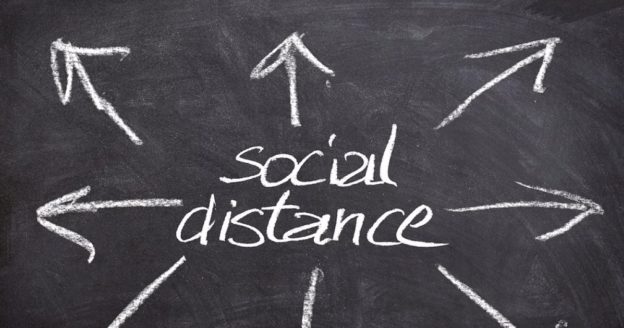NEW COLUMN IS “The Ethics of Social Distancing: A Libertarian Perspective.” It is currently on WND.COM and The Unz Review.
This column is an honest examination of some highly complex questions and issues, without resorting to the smug self-satisfied SIN OF ABSTRACTION: “I’m so ideologically pure, look at me.”
As I say, “If I appear to be struggling with the ethics of this emergency—it is because I am. I must. This is vexing stuff.”
But readers do not want an honest struggle and a multi-faceted, nuanced examination of the issues. They want dogma; their own. Actually, the objections one critical reader mouthed are simplistic Republican dogma, sounded by almost all creedal Republicans; BUT NOT necessarily by all libertarians.
When libertarians begin to sound like Republicans all the time, it’s time to “check your premises.”
In any event, here is a short excerpt. Follow the hyperlinks to the website of your choice:
I was running up the mountain the other day. A couple was walking down it. I quickly crossed over, so as not to expirate all over them. To my surprise, they thanked me profusely.
I’m healthy; they looked fit. Distancing may not have been necessary in this case. Yet, in this simple act of conscious distancing, in the epochal age of a terrifying, communicable disease—my neighbors and I had come closer than ever before. Fear gave way to fellow feeling.
Having lived in both the developed and underdeveloped world, I have always associated social distancing with civility and civilization.
Cultures that honor personal boundaries have always seemed better than cultures which don’t—more genteel, refined and respectful.
Ditto people who keep a respectful distance: They have more merit than those who get in your face.
Which is why the wish expressed by so many freedom-loving protesters to violate the personal space of others is vexing.
Which is why comments such as the following are anathema:
“Your ‘health’ does not supersede my right.”
“Give me liberty or give me COVID-19.”
“I am not required to descend into poverty for you.”
In the absence of clinical therapies or a vaccine for coronavirus, the successful return to work rests, very plainly, on the willingness of the citizenry to cover up, keep clean and keep a distance. Why would anyone wish to infringe on another’s personal space, when the stakes are clearly so high?
Insisting on unfettered freedom to come and go as one pleases, sans protection, comes at a grave cost to others—it could constitute aggression against innocent others.
By the same token, the shuttering of private property by the State is an incontrovertible violation of private property rights. …
... READ THE REST. NEW COLUMN, “The Ethics of Social Distancing: A Libertarian Perspective,” is currently on WND.COM and The Unz Review.
UPDATE I (4/24): Some responses to readers. These should give you some idea of the intellectual climate out there:
Glad you admit, at least, that you are “railing,” and that, what you wrote, to quote, “wasn’t so much disagreement with [me] anyway as [your] own personal anguish.”
The unfortunate state of “thought” on this thread is that it demands a certain dogma to cheer on.
To thinking libertarians, the pandemic presents dilemmas. To tinny ideologues it doesn’t. I’m not a tinny ideologue. Too easy, too dishonest.
I could offer up rah-rah dogma to those who feel anguish and anger. I won’t.
In addition, I am not “advocating” any position, as you asserted; I am explaining positions. Distortions of my text are of a piece with the hysterical tone that develops on the threads to my articles.
There has been no advocacy for tyranny here and there is no applause for the State; only an honest examination of some complex questions and issues, without resorting to the smug self-satisfied SIN OF ABSTRACTION: “I’m so ideologically pure, look at me.”
Actually, what the reader mouths is the simplistic Republican dogma, sounded by almost all creedal Republicans; BUT NOT necessarily by all libertarians.
See: https://apnews.com/cfcdd563167c5ba60aa0e9011f4446cd
When libertarians begin to sound like Republicans, it’s time to “check your premises.”
It’s odd that an honestly conflicted look at the COVID-19 issues from all sides elicits such outrage. Is this the “Closing of the American Mind,” or what?
I recommend hearing from this New Yorker, who is in the thick of it. Warning: nuanced, closely reasoned thinking:
https://www.nyu.edu/projects/sciabarra/notablog/archives/002826.html
https://www.nyu.edu/projects/sciabarra/notablog/archives/002814.html
https://www.nyu.edu/projects/sciabarra/notablog/archives/002811.html
https://www.nyu.edu/projects/sciabarra/notablog/archives/002800.html
https://www.nyu.edu/projects/sciabarra/notablog/archives/002806.html
all the best,
ilana
Thanks for the polite comment, in general, and this sharp observation, in particular:
The reason I as an ex-Objectivist still read Ilana Mercer is that she is one of the few libertarians who know [sic] the difference between anarchy and a functioning government that still prioritizes libertarian freedoms.
Your observation comports with my consistent attempts to avoid “that sin of abstraction.” Reality is the ultimate adjudicator of truth, in my thinking.
I presume, then, that you’ve read “Libertarian Anarchism’s Justice Problem” (2015):
http://www.ilanamercer.com/2015/04/libertarian-anarchisms-justice-problem/
Thanks for your thoughtful feedback.
ilana
That’s another good piece on the “is-ought” dilemma of libertarianism.
I like your citations above re: Republicans as well. The GOP has co-opted many libertarian concepts in the “tactical” fashion I mentioned to WW above, to the discredit of serious thinkers and the concepts themselves.
It’s in the common interest of all anti-establishment thinkers from libertarians to sincere Leftists to nationalist-populists to discredit and ultimately marginalize both major U.S. parties. The GOP is the lowest-hanging fruit. GOP delenda est, then on to the Democrats.
UPDATED II (4/30): If you dare honor the dead …
Remarkable: more illogic. People conflate honoring the dead, the seriousness of the disease & the magnitude of #COVID devastation with betraying liberty. Unless you put on a tinfoil hat about COVID science–you are considered a liberty hater. Crap. https://t.co/ykDazdqULD
— ILANA Mercer (@IlanaMercer) April 30, 2020





@der einzige